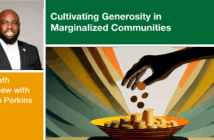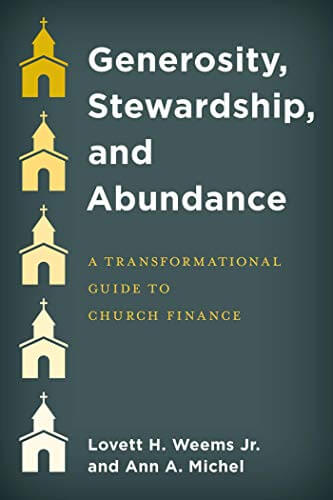Tom Berlin, pastor of Floris UMC in Herndon, Virginia, says that for Christians to become generous, they need the help of a church that itself is generous. Congregations that embody their belief in the generosity and the abundance of God inspire those who want to be part of something bigger and do something more than they can do on their own.
I am convinced that people want to attend a generous church. For Christians to become generous, they need the teachings of Christ related to love, money, and compassion as those teachings apply to everyday life. They need the examples of other believers. They need to learn how to manage money so they will have resources to give others. Most importantly, however, I have come to realize that Christians need the help of a church that itself is generous.
When a church focuses on sharing the gospel message of salvation, then giving becomes a joy and not a hardship. When a church blesses the poor and vulnerable, then people are excited to join that mission. For generous people, the combination of intentionality of ministry, demonstrated results, communication, and trust is a powerful incentive to give. These generous Christians don’t just want to give to a church. They want to be a part of something bigger and do something more than they can do on their own. They want to make a difference in the world, in the name of Christ. That is why they give their time, talent, and money to churches that demonstrate generosity.
When a church lives generously — caring about the hungry, housing the homeless, ministering to the sick and grieving — then even people who are not members will spread the word about its good work.
Think about what happens when a church lives the generous life that Jesus described as the kingdom of God. Such churches have a mindset of abundance. When they do not have money, they assume it can be raised if the importance of their endeavor is properly explained. If they don’t have enough volunteers, they find ways to widen the search by asking people in the community who may not even attend their church. If a member feels called to start a new ministry, they encourage the member rather than offering reasons it won’t work.
Generous churches believe that when God gives a vision, resources will follow. They are willing to endure the discomfort of the time between identifying what they need and receiving what God will offer. Like the children of Israel in the desert, they would prefer to have all the provision for the journey up front, but they are content to pick up the manna day by day, learning to trust that God will not forget their needs as they follow God’s will.
The generous church is a place where people want to participate. Being part of such a church is exciting, because something important is always at stake. If you don’t show up for worship, you may miss a glimpse of God’s grace coming into the world. If you don’t give, a child may go hungry. If you don’t volunteer, someone may not learn about Jesus or find an affordable home. As the church, we must do what Jesus did. We must, out of generosity, find ways to heal the spiritual, physical, economic, and social illnesses of the local community and the world community.
If we don’t live generously, faith becomes a form of spiritual narcissism. The church’s focus is only on its members and can become especially focused on members who are the most vocal about their needs and disappointments. These are the very people most likely to hold a mindset of scarcity, believing that we must keep all we have for fear that we might lose our life as a congregation. Driven by this fear, we decide that money cannot be spent, ministry cannot be undertaken, people should not be made uncomfortable or challenged. It takes very little time to identify a congregation that doesn’t live generously.
By contrast, when we are selfless and live out the gospel, the church becomes a lamp set high on a stand, bringing light to the community. When a church lives generously—caring about the hungry, housing the homeless, ministering to the sick and grieving—then even people who are not members will spread the word about its good work.
When people hear stories about the many forms of generosity the church displays, they are curious and interested. Suddenly evangelism isn’t a theological dueling match with spiritual doubters; it is sharing an experience and a community that enriches its members’ lives. For most people, it’s easy to argue with beliefs, but it’s hard to argue with generous love, expressed in many ways by a community of people who hold the teaching of Christ in common. Generosity turns the church inside out.
This article is adapted from The Generous Church (2016, Abingdon Press) and is part of the Defying Gravity resources published by Abingdon Press. Used by permission. All rights reserved. The Generous Church is available through Cokesbury and Amazon.
Related Resources
- Cultivate Generosity through Thankful Living by Sharron Blezard
- Nine Ways Generosity Leads to Healthier and More Purposeful Living by Ann A. Michel
- Theology of Stewardship and Biblical Generosity Video Tool Kit







